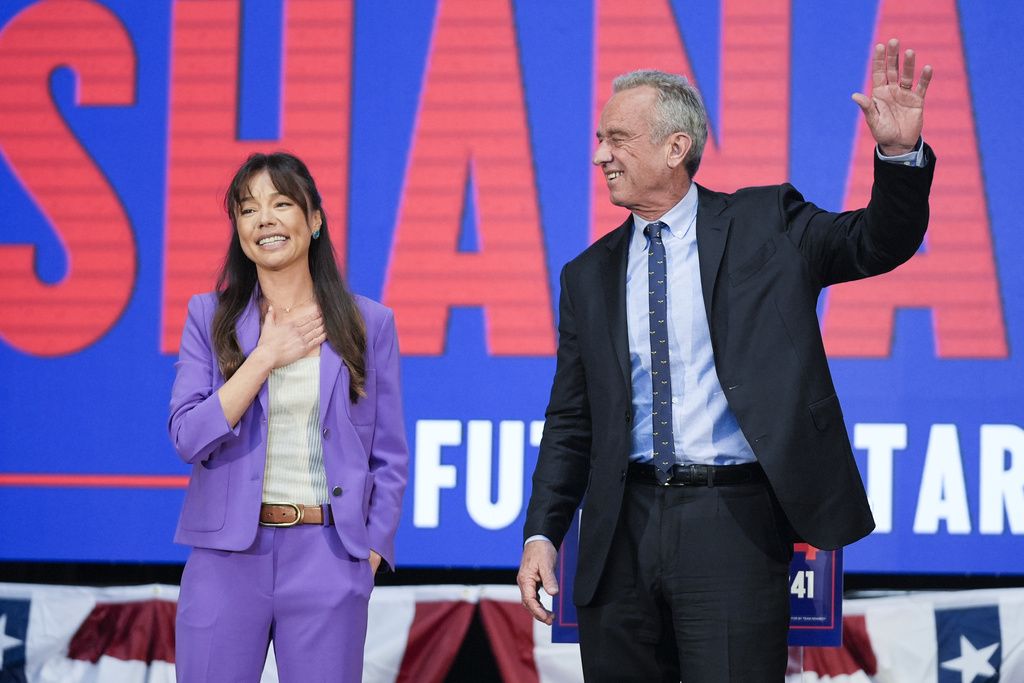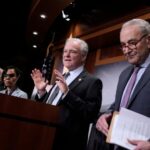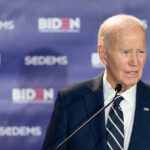
President Joe Biden and former President Donald Trump are set to resume hostilities with the first presidential debate in Atlanta. They are battling low expectations, legal records, and lingering doubts about their records and character, as well as battling each other. The Washington Examiner is taking a closer look at the event, which could transform the entire 2024 contest. Part three will look at independent candidate Robert F. Kennedy’s campaign after he failed to qualify for the debate.
Robert F. Kennedy Jr.‘s inability to qualify for the first presidential debate alongside President Joe Biden and former President Donald Trump is a significant setback for the independent candidate’s struggling campaign.
CNN’s audience would have given Kennedy one of the largest platforms to sell his case to the public as an alternative to the two main contenders. But the infamous Kennedy member proved unable to reach CNN’s requirement of 15% in four reputable national polls and reach enough state ballots to garner 270 Electoral College votes, theoretically.
“Presidents Biden and Trump do not want me on the debate stage and CNN illegally agreed to their demand,” Kennedy pushed back in a statement last week.
“My exclusion by Presidents Biden and Trump from the debate is undemocratic, un-American, and cowardly. Americans want an independent leader who will break apart the two-party duopoly,” Kennedy continued. “They want a President who will heal the divide, restore the middle class, unwind the war machine, and end the chronic disease epidemic.”
But Kennedy’s failure to make the debate stage on Thursday is just the latest setback for his campaign, which has faced barriers to ballot access since launching his campaign, and as he loses momentum in polling.
Kennedy’s campaign claims it has been approved for ballot access in nine states: California, Delaware, Hawaii, Michigan, Oklahoma, South Carolina, Texas, and Utah. The campaign also states it has collected enough signatures in 15 others. In theory, that would give Kennedy access to 323 electoral votes, but the count includes states that have not certified Kennedy.
Only five states have confirmed that Kennedy will appear on their state ballots: Delaware, Tennessee, Oklahoma, Utah, and Michigan, according to the Washington Post.
And although voters were once weary of the rematch between Trump and Biden, their appetite to back another candidate doesn’t appear as strong as it once was, as Kennedy’s poll numbers have decreased over time.
Kennedy currently polls at 10.7% in a RealClearPolitics average of a three-way hypothetical matchup, down from the 12.3% Kennedy held in late March. Polling averages from the Hill and Decision Desk HQ showed Kennedy in the single-digit range at 7.8%, but in late February, he was polling at 11.9%.
Even if Kennedy had made the debate stage, political scholars have claimed that there is some question as to how much making the debate stage would help Kennedy.
“Historically, debates tend not to help any candidate except in the short run, and that may be true of third-party candidates too,” Bernard Tamas, author of The Demise and Rebirth of American Third Parties, said.
“The other thing is with Kennedy is … he seems to be riding more on his name and general dissatisfaction then, then on some sort of galvanizing issues that really pull in voters,” Tamas continued. “His political philosophy is all over the place … so it’s not clear that necessarily the debates will help him.”
Stephen Farnsworth, a political science professor at the University of Mary Washington, said if Kennedy avoided controversial topics including reports that he admitted a parasitic worm “ate a portion” of his brain, it could help him on the debate stage.
“Well, everything depends on what you say. If you get on the debate stage and you talk about brain worms, that’s not going to be helpful,” Farnsworth said. “But if you try to present yourself as a compelling alternative to the choices offered by the major parties, you know that can give you some support.”
Farnsworth compared Kennedy’s debate quest to Ross Perot, who received more votes than any nonmajor party candidate in U.S. history in 1992 and spent at least $60 million of his fortune in his presidential bid.
“If you think back to Ross Perot in 1992, one of the key reasons that he retained his support throughout the election cycle is because he was a part of these debates and because he was able to be heard,” Farnsworth continued. “Perot did what needed to be done to keep himself in the conversation. He still lagged well behind the two major party candidates, as third-party candidates always do. But he was a part of the conversation in a way that RFK Jr. is not and not likely to be without a huge expenditure on his part or getting on the debate stage.”
Kennedy’s campaign filed a complaint with the Federal Election Commission alleging that CNN colluded with the Biden and Trump campaigns to prevent him from joining the debate. It appears unlikely the FEC will weigh in to force the network to allow Kennedy onstage before the Thursday debate. More than 219,000 people have also signed the Kennedy campaign’s petition to have the candidate appear onstage.
Tony Lyons, co-founder of the super PAC backing Kennedy, argued that the American public would rebel against Kennedy’s exclusion from the debate, comparing it to Trump’s New York money trial.
“I think more and more you’re going to see a kind of rebellion by the American people, and you’ve been seeing it to a great extent,” Lyons, head of American Values 2024, said. “And you see it when they donate tons of money to Donald Trump when he’s found guilty of 34 felonies because they don’t believe it’s real.”
Nicole Shanahan, Kennedy’s running mate, and his son Bobby Kennedy III confirmed the campaign will go live at the same time as the Thursday CNN debate. “Ok, cats out of the bag! If you don’t want to watch the CNN fake debate Thursday, we’ve got you covered. Plus a few surprises. Stay tuned,” Shanahan wrote on X.
Both the Trump and Biden campaigns have worried that Kennedy’s quixotic presidential bid could act as a spoiler in the election. Democrats, fearing a repeat of the 2016 election, are working to block Kennedy from gaining ballot access to all 50 states. The party challenged Kennedy in several states, including two battleground states: North Carolina and Nevada.
Nevada Democrats filed a lawsuit last week arguing that Kennedy’s work with third parties to gain ballot access violates Nevada law regarding independent candidates. Clear Choice, a Biden-affiliated super PAC that challenges third-party candidates, also alleged that Kennedy’s work with the We The People party in North Carolina violated state laws due to the party being formed by Kennedy’s campaign.
After failing to make the CNN debate, the Democratic National Committee taunted the scion of one of America’s most famous families.
“RFK Jr.’s campaign is in freefall. Struggling to gain ballot access through traditional, grassroots support, RFK Jr. has resorted to deception and shortcuts,” Ramsey Reid, a DNC adviser, taunted in a memo. “His fundraising has sputtered, as his campaign has struggled to raise money from small-dollar donations and his candidacy is now propped up almost exclusively by two billionaires: his own running mate and Timothy Mellon, Donald Trump’s largest donor.”
Kennedy’s campaign raised just $2.6 million in May according to FEC filings, far below the $85 million Biden and the DNC raised in May and the $141 million that Trump and the Republican National Committee raised in May.

Shanahan, the former ex-wife of Google founder Sergey Brin, has bolstered much of Kennedy’s finances in recent months. The campaign brought in just under $11 million in April, but $8 million came from Shanahan. When Shanahan joined the ticket in late March, she gave $2 million to the campaign. It is unclear if there is any limit to how much Shanahan is willing to give to the Kennedy campaign, but her donations could keep the campaign going until Election Day.
Neither the Kennedy campaign nor the Biden campaign responded to the Washington Examiner‘s requests for comments. The Trump campaign, however, claims the former president has “no problem” debating Kennedy.
CLICK HERE TO READ MORE FROM THE WASHINGTON EXAMINER
“It’s Joe Biden and the Democrats who are using financial and legal resources to prevent RFK’s access to the ballot because they know RFK Jr. is a radical leftist who pulls more votes from Biden than President Trump,” Karoline Leavitt, national press secretary for the campaign, argued in a statement.
Although Kennedy won’t be on the debate stage, there is still an opportunity to make ABC News’s presidential debate on Sept. 10, which has the same requirements as the first debate. He reached 15% in three national polls ahead of the CNN debate and could reach 15% in four national polls before September.





